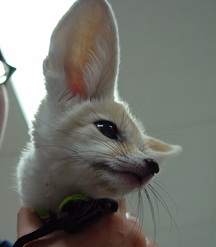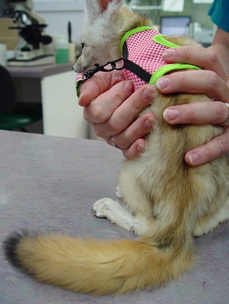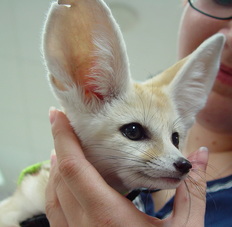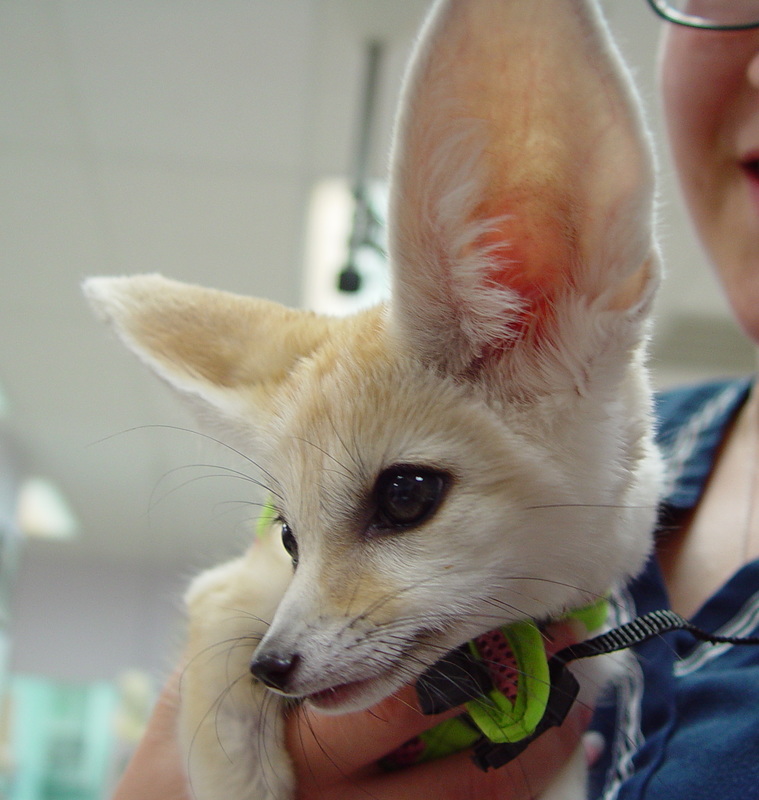Fennec Foxes
Deanne Strat, DVM
Photos and edited by Susan Horton, DVM
Photos and edited by Susan Horton, DVM

Classification
Fennec foxes are the smallest in the Canidae family, closely related to the red and arctic fox. They can live up to 10-14 years with proper care and reach sexual maturity at 9-11 months. The female is known as a “vixen” and a male is known as a “reynard.” They originate from the sandy areas of the Sahara desert of North Africa, from Morocco & Niger to Egypt and Sudan. They are avid diggers, creating dens in which to live and raise kits. Fennec foxes are often hunted in the wild or captured to be sold as exotic pets, and are threatened by increasing urbanization. Though data on population is scarce, they are currently classified as Least Concern by the IUCN.
Anatomy/Physiology
They have soft, thick coats. Their coloration is reddish cream to fawn with a white underbelly. Perhaps their most striking feature is their large ears, which serve to dissipate unforgiving desert heat and listen for bugs crawling underground to eat. They are fastidious animals with no strong odor. They have a heavily furred tail with a violet (supracaudal) scent gland at the end, which is covered with black or dark brown fur. They have anal glands at the 5 and 7 o’clock position of the anus which is used as a scent gland and there are also glands between the toes. Fennec fox teeth are similar to their dog relatives.
Behavior
The Fennec fox is more social than most foxes, and may live in colonies of up to 10 animals. This usually comprises a breeding pair, a litter of kits, and a few older siblings in a given territory. When approached, the captive fox will normally cower, lay on its side, yelp and wag its tail. They have also been known to purr or “sing." Just like dogs and other fox species, fennec foxes are intelligent and quick learners, and can be taught to do tricks or play games like fetch. This is great for enrichment and exercise. Males are often friendlier than females as juveniles, but are also more prone to aggressive behavior upon maturity, as well as other undesirable behaviors such as mounting or marking. Neutering your fennec fox is an important consideration. Fennec foxes are primarily nocturnal, so they will be most active when the rest of the family is likely asleep.
Fennec foxes are the smallest in the Canidae family, closely related to the red and arctic fox. They can live up to 10-14 years with proper care and reach sexual maturity at 9-11 months. The female is known as a “vixen” and a male is known as a “reynard.” They originate from the sandy areas of the Sahara desert of North Africa, from Morocco & Niger to Egypt and Sudan. They are avid diggers, creating dens in which to live and raise kits. Fennec foxes are often hunted in the wild or captured to be sold as exotic pets, and are threatened by increasing urbanization. Though data on population is scarce, they are currently classified as Least Concern by the IUCN.
Anatomy/Physiology
They have soft, thick coats. Their coloration is reddish cream to fawn with a white underbelly. Perhaps their most striking feature is their large ears, which serve to dissipate unforgiving desert heat and listen for bugs crawling underground to eat. They are fastidious animals with no strong odor. They have a heavily furred tail with a violet (supracaudal) scent gland at the end, which is covered with black or dark brown fur. They have anal glands at the 5 and 7 o’clock position of the anus which is used as a scent gland and there are also glands between the toes. Fennec fox teeth are similar to their dog relatives.
Behavior
The Fennec fox is more social than most foxes, and may live in colonies of up to 10 animals. This usually comprises a breeding pair, a litter of kits, and a few older siblings in a given territory. When approached, the captive fox will normally cower, lay on its side, yelp and wag its tail. They have also been known to purr or “sing." Just like dogs and other fox species, fennec foxes are intelligent and quick learners, and can be taught to do tricks or play games like fetch. This is great for enrichment and exercise. Males are often friendlier than females as juveniles, but are also more prone to aggressive behavior upon maturity, as well as other undesirable behaviors such as mounting or marking. Neutering your fennec fox is an important consideration. Fennec foxes are primarily nocturnal, so they will be most active when the rest of the family is likely asleep.

Housing
The Fennec fox should be kenneled when not supervised. A large dog crate or ferret cage would suffice. They should be kept in an area with low humidity and good ventilation. Avoid dusty or strong smelling bedding such as pine or cedar. They can be litter box trained and a covered cat box with a clay litter can be used.
Fennecs are strong diggers and good climbers so make sure to account for both when setting up an enclosure. Despite being nocturnal, they love to bask in the sun. If outside they should be on a harness and leash, but do not use a collar. Use caution even with a harness, because if startled, they still may wiggle free.
Diet
Fennec foxes are omnivorous and eat a variety of foods in the wild including insects, small mammals, birds, lizards, fruits and roots. In captivity, they should be fed Mazuri Exotic Canine Diet (www.mazuri.com; 800-227-8941). You can supplement with a variety of fresh fruits, vegetables, eggs, crickets and mealworms.
Be sure not to overfeed; an ideal weight is between 2 to 3lbs. Avoid items such as onions, garlic, chocolate, caffeine, avocado, and other items toxic to dogs/canids. Offer fresh water at all times.
The Fennec fox should be kenneled when not supervised. A large dog crate or ferret cage would suffice. They should be kept in an area with low humidity and good ventilation. Avoid dusty or strong smelling bedding such as pine or cedar. They can be litter box trained and a covered cat box with a clay litter can be used.
Fennecs are strong diggers and good climbers so make sure to account for both when setting up an enclosure. Despite being nocturnal, they love to bask in the sun. If outside they should be on a harness and leash, but do not use a collar. Use caution even with a harness, because if startled, they still may wiggle free.
Diet
Fennec foxes are omnivorous and eat a variety of foods in the wild including insects, small mammals, birds, lizards, fruits and roots. In captivity, they should be fed Mazuri Exotic Canine Diet (www.mazuri.com; 800-227-8941). You can supplement with a variety of fresh fruits, vegetables, eggs, crickets and mealworms.
Be sure not to overfeed; an ideal weight is between 2 to 3lbs. Avoid items such as onions, garlic, chocolate, caffeine, avocado, and other items toxic to dogs/canids. Offer fresh water at all times.

Annual Checkup
All Fennecs should be spayed or neutered at around 6 months of age. They require annual vaccines. Please note that all medications and vaccines are considered “off-label” meaning they were not tested or approved for use in this species. Rabies vaccination is not recognized legally, but will protect you and your fox from the disease.
They should be vaccinated yearly for Rabies, Canine Distemper, Canine Parvo virus and Canine Hepatitis. They should be tested annually for heart worm disease and be on heartworm prevention as well as flea and tick preventative. They should have annual fecal exams.
Common Illnesses
Fennec Foxes are prone to many of the diseases seen in dogs. Some are husbandry related and can be prevented. Common illnesses include: kidney disease, liver disease, heart disease, pneumonia, skin infections/parasites, eye infections or glaucoma, intestinal parasites, dental disease, obesity, histoplasmosis and toxoplasmosis.
Fennec foxes can also carry some diseases that may be contagious to people such as tuberculosis, rabies, leishmaniasis, and some intestinal parasites.
All Fennecs should be spayed or neutered at around 6 months of age. They require annual vaccines. Please note that all medications and vaccines are considered “off-label” meaning they were not tested or approved for use in this species. Rabies vaccination is not recognized legally, but will protect you and your fox from the disease.
They should be vaccinated yearly for Rabies, Canine Distemper, Canine Parvo virus and Canine Hepatitis. They should be tested annually for heart worm disease and be on heartworm prevention as well as flea and tick preventative. They should have annual fecal exams.
Common Illnesses
Fennec Foxes are prone to many of the diseases seen in dogs. Some are husbandry related and can be prevented. Common illnesses include: kidney disease, liver disease, heart disease, pneumonia, skin infections/parasites, eye infections or glaucoma, intestinal parasites, dental disease, obesity, histoplasmosis and toxoplasmosis.
Fennec foxes can also carry some diseases that may be contagious to people such as tuberculosis, rabies, leishmaniasis, and some intestinal parasites.
Vital Statistics
Reference
Exotic DVM Veterinary Magazine Vol 5.4
Exotic DVM Veterinary Magazine Vol 5.4


